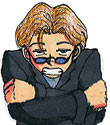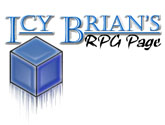Literary Qualities in RPGs
Final Fantasy 7
By The RPGenius
It is a well-known fact that RPGs are known for their story lines. What is not often realized is that these story lines contain devices and characters that can be easily compared to important and great literature. Those who dismiss video game story lines as trash often don't look closely at these games. The people who truly observe, without casually and prematurely dismissing, can find a wealth of qualities shared by some of the greatest literature written.
My first subject in this line of editorials will be Final Fantasy 7. Some may scoff at the thought of this game being compared to the literary great that is Herman Melville's Moby Dick, but the two are so similar that it's almost shocking.
The story of Moby Dick is centered around the crazed captain Ahab of the Pequod embarking on a mad search for the great white whale, Moby Dick. To anyone else, Moby Dick is just a whale, but to Ahab, Moby Dick represents God. In a previous encounter with this whale, Ahab has lost his leg (now replaced by an ivory peg leg). Ahab seeks him out for two reasons: one, for vengeance, but two, and more importantly, to prove that mankind has free will and can do whatever he wishes. Ahab believes that God has given each man his fate, and that the man has no choice but to live his life in the way destiny and God have decided. Ahab believes that by slaying Moby Dick, the white whale that symbolizes God, he can prove that he guides his own life and that man has free will.
Ahab is the main character of Moby Dick. And Cloud Strife is the main character of his game, Final Fantasy 7. One might not see the similarities immediately, but Cloud Strife is exactly the same as Captain Ahab. Cloud, like Ahab, relentlessly pursues Sephiroth in an obsessed manner. Years ago, Cloud's town was destroyed by Sephiroth, and for that, Cloud seeks revenge, much as Ahab seeks revenge for his lost leg. Once Cloud knows that Sephiroth is alive, he begins seeking him obsessively, wishing to even the score and "end this". And, once he realizes that something is making him do things he doesn't want to, it becomes imperative to him to prove that Sephiroth has no control over him and that he decides his own actions. Just like Ahab. Sephiroth's hair is even white, like Moby Dick.
Not only are their personalities the same, but their actions are very alike as well. Ahab, after his first loss, vows to have revenge on Moby Dick and pursues him partially for that reason. Cloud also pursues Sephiroth for the same reason: revenge for a horrible loss which occurred before the story/game begins. Later in Moby Dick, Ahab suffers another loss: his ivory peg leg is shattered. Once more, Ahab loses something dear, this time as a result of pursuing the whale. Cloud also loses something dear for pursuing Sephiroth: his companion, Aeris. After losing Aeris, Cloud is told that he is no more than a puppet. Shortly after, Cloud realizes that something, some part of him, is at least partially controlled by Sephiroth, and that Sephiroth is leading him on. Ahab, after losing his leg for the second time, shortly after begins wondering if he really is in charge of his defiance of God, or if he is simply fated to oppose God and battle against him. Both reach similar realizations after their second losses.
However, after these realizations, Cloud and Ahab take similar responses. Ahab decides that if this is his fate, then he will look it in the eye and face it defiantly. He ignores the possibility of simply going home and ignoring his fate. Cloud is the same way. Rather than turn back because he now knows that Sephiroth is leading him on, he continues to follow him in the vain hope of destroying him. Neither one is strong enough to simply pack it up and head home before further disaster occurs.
Finally, when they both fully realize that they have been manipulated all along, that God had made Ahab's fate to oppose Him and Sephiroth manipulated Cloud into bringing him the Black Materia, it is too late for both to turn back. Ahab's ship is destroyed, and he throws his harpoon in one final act of defiance. Cloud's group is separated from him, and he meekly follows his manipulator's commands and gives Sephiroth the Black Materia.
The similarities between Cloud and Ahab and their quests are not the only ones to be found. Ahab has a first mate, Starbuck. Starbuck is a sensible man who would be able to convince Ahab to stop this insane hunt, but simply is not a man who can stand up and take command. He does not want to have a confrontation with Ahab, and so often does not openly oppose Ahab's insanity. Starbuck has his own entity in FF7 in the form of Tifa, the woman who loves and follows Cloud, no matter where he may roam. Both Tifa and Starbuck are the voices of reason in their respective journeys. They know when something's wrong, and they know what it is as well. Tifa, like Starbuck, knows when Cloud is wrong and when something ought to be done to fix the problem, but also like Starbuck, finds that she can't. When Cloud first tells his story, Tifa knows that Cloud is either lying or is not even Cloud. Yet she says nothing, not wanting to openly confront him, even though he is telling false events and she didn't see him in Nibelheim those years ago. Occasionally, she will question him and his memory, and hint at something not being right, but cannot find the courage to face him outright with her suspicions until it is too late.
The other similarities are not as full, but are there. Aeris and Nibelheim have been mentioned as being the losses for Cloud, as Ahab had his losses to his leg. Barret could be considered a likeness for Ahab's second mate, Stubb, who is intelligent enough to see problems, but does not quite grasp their meanings. An example of this might be in the Shinra Building when Cloud sees Jenova in her tank. While Cloud is shaken up by Jenova, Barret simply sees it as a headless ghoul, and does not see anything worth examining to it. The title of Ishmael, the calm narrator of the story of Moby Dick, and the only one to survive to tell the tale, can be compared to the calm Red XIII, who, in the ending of the game, is seen telling children of his species (presumably descendants of his) about the events of the battle against Sephiroth, Jenova, and Meteor. Fedallah, the man from the eastern part of the world who makes prophecies about Ahab's voyage, is shown partially by Cait Sith, who, in his first encounter with Cloud, makes the prediction that Cloud will find what he wants, but lose what he holds most dear (what he holds most dear could be Aeris, or perhaps simply his free will and freedom). Both people's prophecies come true, though neither person's predictions are understood at the time. One last similarity is that Moby Dick was among the first great pieces of literature to feature characters of a different racial ethnicity (most notably the kind and noble Queequeg) that was portrayed as a human being. While the loud, angry Barret does not go to any strides to break a stereotype, he is the first Negro to be a main character in any Final Fantasy (some may argue that General Leo was, but Leo was not a main character, and his racial ethnicity can be debated).
The differences between Moby Dick and Final Fantasy 7 exist (most notably that FF7 ends in the salvation of the world and the defeat of Sephiroth whereas MD ends in the destruction of the Pequod and the victory of Moby Dick), but the similarities between the two are too close to be mere coincidence.
The Freezer Archives
This Page © Copyright 1997, Brian Work. All rights reserved. Thanks to Sax for his help with the layout. Do not take anything from this page without my consent. If you wish to contact an author, artist, reviewer, or any other contributor to the site, their email address can be found on their index page. This site is link-free, meaning you don't need to ask me if you'd like to link to it. Best viewed in 1024x768.

